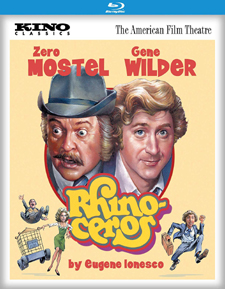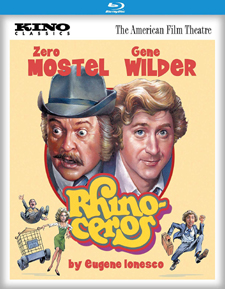Rhinoceros (Blu-ray Review)

Director
Tom O'HorganRelease Date(s)
1974 (May 7, 2019)Studio(s)
American Film Theatre (Kino Classics)- Film/Program Grade: C+
- Video Grade: A
- Audio Grade: A
- Extras Grade: B
Review
Adapting a satirical theater of the absurd political allegory into film is a challenging task. With Rhinoceros, one of the American Film Theatre productions of the early 1970s, director Tom O’Horgan (Broadway’s Hair and Jesus Christ Superstar) captures the whimsy of the piece without losing the significance of its theme. O’Horgan assembled an excellent cast headed by Zero Mostel and Gene Wilder – their only screen pairing after The Producers – and opened the play slightly but well within the parameters of the original.
The first half-hour is easily the best part of the film. Friends Stanley (Wilder) and John (Mostel) meet at a crowded diner on Sunday morning. John, fastidious and formal in attire and manner, is the complete opposite of sloppy drunkard Stanley. The self-satisfied, punctilious John repeatedly criticizes Stanley, ostensibly for his friend’s own good, while the hapless and hopeless Stanley tolerates the veiled abuse. An employee in a small, bleak accounting firm, Stanley mopes, disengaged from the repetitiveness of his interchangeable days and his few, insufferable coworkers. The only exception is the company’s cheerful secretary, Daisy (Karen Black), but Stanley is so consumed with self-contempt that he buries his feelings for her in ledgers, memos, and mounds of reports.
In the diner, a violent rumbling outside brings everyone rushing to the window, where they see a herd of rhinoceroses (not shown) running down the street. No one appears unusually surprised and the customers go back to their tables.
Eventually we discover that human beings are gradually being transformed into rhinos. Though some hold out and resist, they eventually succumb.
O’Horgan successfully exploits the great screen chemistry between Mostel and Wilder, which makes the first half-hour so alive and the rest of the movie so pale by comparison. Generous helpings of slapstick enliven this section and tap into Mostel’s and Wilder’s strengths, but this makes for a different tone completely from the rest of the film.
To his credit, O’Horgan compensates for the lack of live rhinos with sound effects, dust clouds, shaking walls, and actors’ reactions to the pachyderm chaos. He also opens up the play with a scene on a beach, a few street scenes, and a climactic scene on a rooftop. The location has been changed from a French town to Anywhere, USA.
Mostel, whose role is not the major one in the play, dominates the film with his imposing physical presence, larger-than-life performance, improvisational touches, and flair for comedy. He gets laughs with the slightest gesture and by giving the dialogue his unique interpretation. Because he’s so good, he’s sorely missed when Wilder has to carry on without him. He simply doesn’t hold the viewer the way Mostel can.
The theme of Rhinoceros is that conformity can be dangerous when people go along mindlessly. Written in 1960, 15 years after the end of World War II, the play allegorically comments on the rise of Hitler, though its message is sadly relevant in today’s political climate. The latter part of the movie underscores this theme as Stanley stays determined not to succumb to rapidly encroaching societal pressure.
The Blu-ray release, featuring 1080p resolution, is presented in a 1.78:1 aspect ratio. Picture is sharp throughout, with natural color. Daisy’s outfits are in soft pastels appropriate to the character, John picks a red rose from a bush for his lapel, and the sunny beach scene features a clear blue sky against waves breaking on the shore. Wilder’s blue but bleary and red-rimmed eyes register boldly. The accounting office has a bleak, musty look.
Sound is clear throughout, with dialogue distinctly delivered by all cast members. Key sound effects involve the unseen rhinos, with a gradation of pounding, snorting, shrieking herd noises ranging from distant, heard under dialogue, to very loud when rhinos get closer, destroying a staircase and trapping Stanley, Daisy and co-workers on the second floor. We see the staircase collapse amid a cloud of dust as sounds of the herd get more distinct and much louder. The rhino sounds remind the viewer that these beasts are ubiquitous, their number constantly growing. Optional English subtitles are available for the deaf and hard-of-hearing.
Bonus features on the PG-rated Blu-ray release include an interview with director Tom O’Horgan, an interview with Edie Landau, a promotional film for the American Film Theatre, and a gallery of trailers for the American Film Theatre.
Interview with Director Tom O’Horgan – This interview was conducted in New York City in 2002. Rhinoceros by Eugene Ionesco appeared on Broadway in 1961. The film version was made in 1973 and was released the following year as part of the American Film Theatre subscription series. O’Horgan discusses adapting the play into film, noting it was difficult portraying a world in which humans were turning into rhinos. In casting, he was looking for actors who “gave off an unreal vibe.” Zero Mostel was the first person he thought of. The director loved Mostel’s performance in The Producers and his chemistry with Gene Wilder. These were “people bigger in personality” than the average actor. Wilder didn’t do what he intended during filming until the fifth or sixth take so Mostel “wouldn’t screw it up.” With Mostel, each take was so different that O’Horgan couldn’t intercut them. Mostel was very much a theater actor who brought spontaneity to his performance. The part Mostel plays – John – is not the biggest role in the play. O’Horgan did get a real rhino for the film even though he was warned that rhinos can’t be directed. Wilder was able to “roll with” unforeseen situations that occurred during takes. O’Horgan briefly discusses directing Hair and Jesus Christ Superstar on Broadway, and credits Julian Barry with adapting Rhinoceros into a screenplay. O’Horgan started writing the score for Rhinoceros but backed off when the intricacies of timing musical cues precisely to action on screen became too cumbersome. He hired Galt MacDermot to write the music and, according to O’Horgan, he wrote a rhythmic score full of energy. The interview concludes with O’Horgan offering his impressions of Hollywood.
Interview with Edie Landau – Edie Landau is the widow Ely Landau, one of the producers of the American Film Theatre. The Landaus had produced Play of the Week for television, using talent from the theatre. Later, they produced a lengthy documentary on the life of Martin Luther King, Jr., and had it shown in 550 theaters nationwide. Their plan was to produce a series of films adapted from great plays, which would be subsidized by American Express, the actors themselves (leading players received a standard fee of $25,000), and the public, who would subscribe to the entire series. The rights to some plays were bought from Hollywood studios, directors were hired, and the directors hired their own film crew. Ms. Landau notes that getting the actors was the easiest part of the process, since they all believed in the project. The most expensive movie was Lost in the Stars because of location filming in Jamaica. The biggest problem encountered was fulfilling ticket requests. American Express set up a “war room” to see that tickets got to subscribers. A frequent criticism of the films was that they were too stage-bound.
Ely Landau: In Front of the Camera – This promotional short film originally preceded the eighth and final film in the subscription series, and includes clips from movies in the series. Producer Ely Landau is the on-screen narrator.
Trailers – Trailers from the American Film Theatre films include Butley, A Delicate Balance, Galileo, The Homecoming, The Iceman Cometh, Jacques Brel Is Alive and Well and Living in Paris, Lost in the Stars, Luther, The Maids, The Man in the Glass Booth, Rhinoceros, and Three Sisters.
– Dennis Seuling

